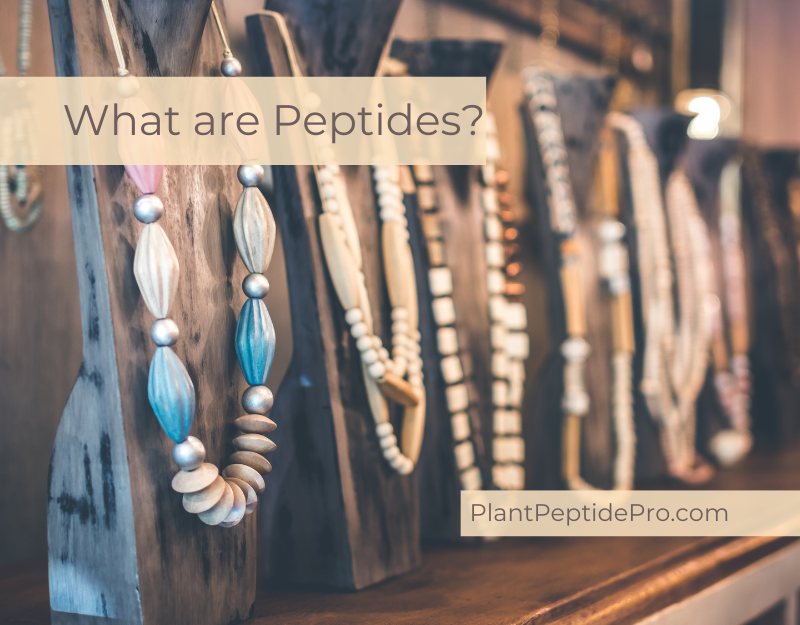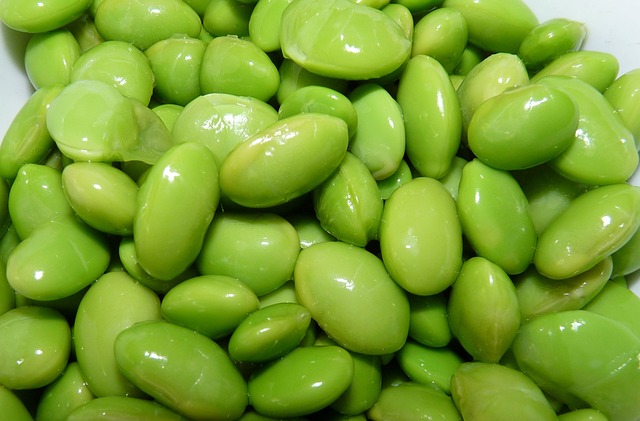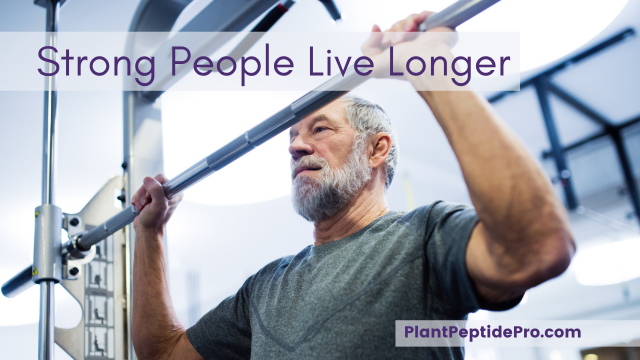Since I share affiliate marketing strategies with awesome people like you, naturally my content may contain affiliate links for products I use and love. If you take action (i.e. subscribe or purchase) after clicking one of these links, I'll earn some coffee money ☕ which I promise to drink while creating more helpful content. My earning a commission has no impact on the price you pay for a given product or service.
Did you know that after age 30, we lose 3-5% of our muscle mass per decade? It's a scary statistic, because muscle is the secret to living longer.
But there's hope!
In this article, we'll look at how plant-based peptides for seniors are revolutionizing the way we approach muscle maintenance as we get older. Get ready to unlock the secret to staying strong and vibrant in spite of the grey in your beard!
Definition of Sarcopenia:
Ever heard of sarcopenia? It's not exactly dinner table conversation, but it's crucial to understand. Sarcopenia is the fancy medical term for age-related muscle loss. It's derived from Greek words: "sarx" meaning flesh and "penia" meaning loss. Essentially, it's your body's way of saying, "Hey, I'm not as young as I used to be!"
Factors Contributing to Muscle Loss:
Impact on Overall Health and Quality of Life:
Now, you might be thinking, "So what if I can't open jars as easily?" But the impact of muscle loss goes way beyond that!
But let not your heart be troubled!
Understanding these changes is the first step in fighting them.
In the following sections, we'll talk about how plant peptides for seniors can be your secret weapon in the fight to stay strong and live longer.
Aging is inevitable, but how we age is up to us.
Who says you can't teach an old dog new tricks? Your muscles are about to get a plant-powered upgrade!
The Power of Plant-Based Peptides

OK, so let's look at the secret weapon in our fight against age-related muscle loss: plant-based peptides for seniors. These tiny but mighty molecules are revolutionizing the way we approach muscle maintenance as we age.
What are peptides?

Proteins are like long chains of beads, and peptides are the shorter, cooler cousins. Peptides are small chains of amino acids - the building blocks of protein. They're like the Special Forces of the protein world: small, efficient, and incredibly effective. When it comes to plant-based peptides, we're talking about these powerful compounds derived from vegan protein sources.
Benefits of plant-based peptides for muscle health
1. Rapid absorption: Plant-based peptides are like express trains to your muscles. They're easily digestible and quickly absorbed, making them ideal for seniors who might have slower digestion.
2. Muscle synthesis boost: These peptides encourage muscles to build and repair themselves. They're especially crucial for senior strength training and muscle recovery in seniors.
3. Anti-inflammatory properties: Many plant peptides have anti-inflammatory effects, which can help reduce muscle soreness and promote faster recovery.
4. Hormone regulation: Some plant peptides can help balance hormones that play a role in muscle maintenance.
5. Antioxidant effects: Plant-based peptides often come with a bonus - antioxidants! These help combat oxidative stress, which can contribute to muscle loss. It's like having a shield against the villains of aging.
For more details on the benefits of these proteins, see this article:"7 Powerful Collagen Peptides Benefits Every Man Over 50 Needs to Know"
Comparison to animal-based protein sources
Now, you might be wondering, "Why choose plant-based peptides over my trusty steak?" Great question! While animal proteins are complete proteins, plant-based options are gaining ground fast:
When it comes to protein quality for older adults, it's not just about quantity but quality and absorption. Plant-based peptides tick all these boxes!
By incorporating plant-based peptides into your diet, you're not just feeding your muscles; you're giving them the tools they need to stay strong and vibrant. Whether you're exploring vegan protein powders for seniors or looking to add more plant-based protein sources to your meals, you're on the right track to the muscular fountain of youth!
Top Plant-Based Peptide Sources for Seniors
When it comes to maintaining muscle mass as we age, plant-based peptides can be a game-changer. Let's explore some of the best sources of these powerful proteins that can help keep our muscles strong and healthy.
Soy Protein

Soy has been a staple in many diets for years, and for good reason. It's a complete protein, which means it contains all the essential amino acids our bodies need. Research has shown that soy protein can be effective in helping older adults maintain muscle mass.
You can find soy protein in various forms. Edamame, which are young soybeans, make for
a nutritious snack. Tofu, a versatile soy product, can be added to many dishes for a protein boost. There are also soy protein powders available if you prefer a more concentrated form.
Pea Protein
Pea protein has gained popularity in recent years, and it's not hard to see why. It's easy to digest and rich in branched-chain amino acids, which are important for muscle health. This makes it an excellent choice for seniors looking to support their muscle mass.
You can find pea protein in powder form, which is easy to add to smoothies or use in baking. It has a mild flavor that blends well with other ingredients, making it a convenient way to increase your protein intake.
Rice Protein
If you have a sensitive stomach or food allergies, rice protein might be a good option for you. It's hypoallergenic and gentle on the digestive system, which can be particularly beneficial for seniors.
Brown rice protein is especially nutrient-dense. You can find it in powder form, which can be easily mixed into various foods. Adding it to your morning oatmeal or smoothie is a simple way to boost your protein intake at the start of the day.
Hemp Protein
Hemp protein might not be as well-known as some other plant proteins, but it's worth considering. It's not only a good source of protein but also contains omega-3 fatty acids, which can help reduce inflammation in the body.
Hemp seeds can be sprinkled on salads or added to smoothies for an easy protein boost. Hemp protein powder is also available if you prefer a more concentrated form.
Incorporating these plant-based proteins into your diet doesn't have to be complicated. Small, consistent additions to your meals can make a significant difference in supporting your muscle health as you age. Remember, it's always a good idea to consult with your doctor or a nutritionist before making major changes to your diet, especially if you have any health conditions or concerns.
Exercise and Plant-Based Peptides: A Winning Combination
When it comes to maintaining muscle mass as we age, combining exercise with a diet rich in plant-based peptides can be particularly effective. Let's explore how these two factors work together to help keep us strong and active.
Synergistic Effects of Resistance Training and Peptide Intake
Resistance training, which includes activities like weightlifting or using resistance bands, is excellent for building and maintaining muscle. When we pair this type of exercise with plant-based peptides, we create a powerful duo for muscle health.
Plant-based peptides provide the building blocks our bodies need to repair and grow muscle tissue. When we exercise, we create small tears in our muscle fibers. Our body then uses proteins, including these peptides, to repair and strengthen these fibers. This process is how we build stronger muscles over time.
Best Exercises for Seniors to Maintain Muscle Mass
As we age, we need to make certain we maintain muscle mass. It is, more than anything else we can do, the key to longevity. Here are a couple ways to stay on top of it:
Bodyweight exercises: These include activities like squats, push-ups, and lunges. They're great because they use your own body weight as resistance and can be modified to suit different fitness levels.
Resistance bands: Resistance bands are versatile tools that can help strengthen various muscle groups. They're also easy to use at home and gentle on the joints.
Light weightlifting: Using light dumbbells or weight machines can help build and maintain muscle strength. It's important to start with weights you can handle comfortably and gradually increase as you get stronger. Work a t a pace that will let you stick with it; don't burn yourself out in the first week, remembering what you could do in your twenties.
Yoga or Pilates: These practices can help improve strength, flexibility, and balance, all of which are important as we age.
Creating a Balanced Workout Routine
A balanced workout routine should include a mix of different types of exercise. Aim for a combination of strength training, cardiovascular exercise, and flexibility work. This variety helps ensure that you're supporting overall health while also focusing on muscle maintenance.
For example, you might do resistance training two to three times a week, take a brisk walk on other days, and incorporate some stretching or yoga into your daily routine. Remember, it's always best to start slowly and gradually increase the intensity and duration of your workouts.
By combining regular exercise with a diet rich in plant-based peptides, you're giving your body the best chance to maintain muscle mass and strength as you age. As always, it's important to consult with your doctor before starting any new exercise program, especially if you have any existing health conditions or concerns.
Additional Benefits of Plant-Based Peptides for Seniors
While maintaining muscle mass is a key benefit of plant-based peptides, these powerful nutrients offer several other advantages for seniors. For one, many plant-based peptides can support digestive health. They're often easier to digest than animal proteins, which can be particularly beneficial for older adults who may experience changes in their digestive systems as they age.
Plant-based peptides may also play a role in supporting immune function. As we get older, our immune systems can become less effective, but a diet rich in plant-based proteins can help maintain immune health. Additionally, many plant-based peptides have anti-inflammatory properties. This can be particularly beneficial for seniors, as inflammation is associated with various age-related health concerns. By incorporating these peptides into their diets, seniors may be able to support their overall health and well-being beyond just maintaining muscle mass.
Overcoming Common Concerns About Plant-Based Proteins
One of the most frequent concerns about plant-based proteins is whether they provide all the necessary amino acids. While it's true that some plant proteins are not "complete" on their own, eating a variety of plant-based protein sources throughout the day can easily provide all the essential amino acids your body needs. Another common worry is about protein absorption. However, research has shown that plant proteins can be just as effective as animal proteins in supporting muscle health when consumed in appropriate amounts.
For those with dietary restrictions or allergies, plant-based proteins often offer more options. Soy, nuts, and wheat are common allergens, but there are many alternatives like pea, rice, and hemp proteins. If you're concerned about getting enough protein from plant sources, consider speaking with a nutritionist. They can help you plan a balanced diet that meets your protein needs while addressing any specific health concerns you may have.
Conclusion
Throughout this article, we've explored the importance of maintaining muscle mass as we age and how plant-based proteins can play a crucial role in this process. We've discovered that these powerful nutrients not only support muscle health but also offer additional benefits such as improved digestive health, enhanced immune function, and potential anti-inflammatory properties. By combining a diet rich in plant-based proteins with regular exercise, seniors can take significant steps towards preserving their strength, mobility, and overall well-being.
If you're looking to incorporate high-quality plant-based protein into your diet, consider trying Life Shake™. This convenient and delicious meal replacement offers 20 grams of non-GMO plant protein per serving, along with 6 grams of fiber and 24 essential vitamins and minerals. Life Shake™ is specially formulated to support energy, satiety, and overall health, making it an excellent choice for seniors looking to maintain muscle mass and support their nutritional needs. Why not give it a try and take the first step towards a stronger, healthier you? For more information, [Click Here]
